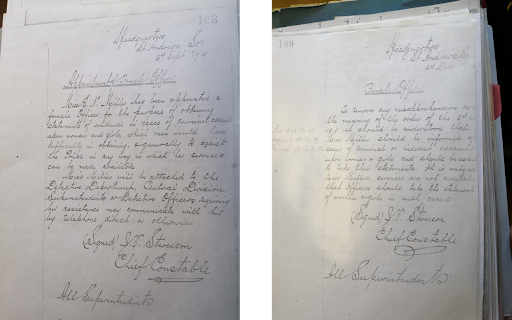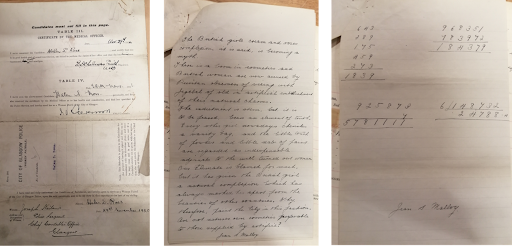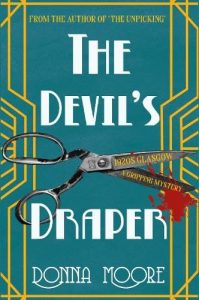Researching Glasgow’s first Women Police
By Donna Moore
During World War I, with so many male police officers away fighting, the Glasgow Vigilance Association, a branch of the Suffrage Movement, took the initiative and patrolled the streets. One such woman was nurse Emily Miller. On 6th September 1915, Miller was appointed to the police force in Glasgow, although her official title was “Statement Taker”. She was office based, didn’t wear a uniform, didn’t have a warrant card, had no powers of arrest and she had a very specific brief. Her appointment was noteworthy, but the newspapers of the day struggled with what to call her, with one referring to her as a “lady policeman”.
For my research for The Unpicking and The Devil’s Draper I delved into the records at the Glasgow Police Museum and Glasgow’s fabulous Mitchell Library. Sadly, records for Emily Miller are sparse, although I did come across two letters from Glasgow’s Chief Constable to all police superintendents.

Reading between the lines, there was a reluctance to use her services. The first letter, dated September 1915, states that Miller’s job is to take statements from women and young girls in cases of assault and to assist in any other way in which her services can be useful. In December, he had to write to them again, to tell them that they had to use her services.
Scotland’s first paid, uniformed, policewoman was Jean Thomson in Dundee in 1918. In late 1919, the appointment of ten women constables was approved for Glasgow. The requirements were that they should be aged between 25 and 38, and a minimum of 5’4” tall. They should be able to read well, write legibly and have a fair knowledge of arithmetic, spelling and composition. They should be strong, fit, intelligent and not have young children.
The Mitchell Library archives include application forms, references, conduct and sickness records for some of these new recruits, as well as hand amended forms changing ‘he’ to ‘she’ and some of the writing and arithmetic tests they did. I spent a fascinating day with these records. Not all of the records have survived, unfortunately. However, one whose records are available is Jean Malloy who joined in November 1920. She was previously a railway carriage cleaner and had also volunteered as an unpaid social worker during the war.. She ended up as an Inspector with 30 years’ service.

I was particularly fascinated by the arithmetic and writing tests the recruits were given. The subject of Jean Malloy’s essay was “The British girl’s cream and roses complexion, it is said, is becoming a myth.” In The Unpicking, my protagonist, Mabel Adair, is employed as a Statement Taker in 1919, and is given that very essay title by the police superintendent who is forced to employ her against his will and makes her life as difficult as possible. These small pieces of “poignant trivia” are one of the serendipitous joys of historical research and one of the reasons I love it.

—
Donna Moore is an author of crime fiction and historical fiction based in Glasgow. Her first novel, a Private Eye spoof called Go To Helena Handbasket, won the Lefty Award for most humorous crime fiction novel and her second novel, Old Dogs, was shortlisted for both the Lefty and Last Laugh Awards. ‘The Unpicking’ was published with Fly on the Wall Press in 2023. Her short stories have been published in various anthologies. In her day job she works as an adult literacy tutor for marginalised and vulnerable women at Glasgow Women’s Library, facilitates creative writing workshops and has a PhD in creative writing around women’s history and gender-based violence. 
THE DEVIL’S DRAPER
FROM THE AUTHOR OF ‘THE UNPICKING’
When whispers of abuse at Arrol’s department store reach Mabel, a determined policewoman, she knows she must act. Enlisting the help of Johnnie, a cunning thief, and Beatrice, a savvy businesswoman, they embark on a perilous journey to uncover the truth.
Set against the backdrop of 1920s Glasgow, where women’s voices are often silenced, this thrilling tale weaves together crime, justice, and the fight for equality. As the trio inches closer to exposing the scandal, they realize that in a world where women are rarely believed, their very lives may be at stake.
‘The Devil’s Draper is a history-mystery, inspired by a true crime, and yet striking in its topicality. Donna Moore tells a dark story, but with a light touch and plenty of pace.’- Martin Edwards, Author of the Rachel Savernake series
‘A page-turning historical mystery set in 1920’s Glasgow…This novel throws the fight for women’s rights into stark relief, showing us how far we have come, and how far we still have to go.’ – Rachel Canwell @bookbound2019, Author of ‘Paper Sisters’
Category: On Writing






























